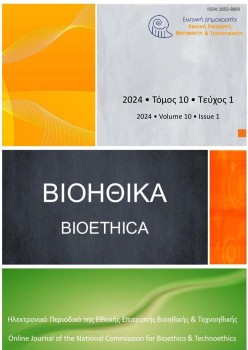The human person and the post-human vision: A theological approach

Abstract
Arriving in the era of Second - or Liquid - Modernity, man succeeds in breaking the shackles of tradition, and relying on his own forces promotes the model of the free, self-sufficient man.
The desire of man to evolve into a more gifted being in order to improve his conditions of life is not new, but inherent in mankind. Philosophy and religion tried to provide solutions to the ardent demand of improving human nature, each one from its own perspective. In the era of Late (Liquid) Modernity, man has managed to break the limitations of tradition and, based on his own resources, to promote the model of the free man who voluntarily determines his own destiny.
In our time through the extremely rapid progress of Science and Technology, man redefines his identity as a human person and his overall relationship with God and the environment as well. The holistic transformation of the structure elements that formed the foundations of modernity is typical of the transition to a post-modern era that requires a new identity for man, that of the post-human. The post-human is no longer an utopian vision but is sought through Transhumanism and interfaces.
The question is whether mankind will preserve its identity as a “human person” with the characteristics of the being created by God or whether it will be transformed into a narcissistic, omnipotent and autonomous existence, separating mankind from its humanity.
Article Details
- How to Cite
-
Douramani, G. (2024). The human person and the post-human vision: A theological approach. Bioethica, 10(1), 24–46. https://doi.org/10.12681/bioeth.37388
- Section
- Original Articles

This work is licensed under a Creative Commons Attribution 4.0 International License.
Authors who publish with this journal agree to the following terms:
- Authors retain copyright and grant the journal right of first publication with the work simultaneously licensed under a Creative Commons Attribution CC BY 4.0 License, which allows for immediate free access to the work and permits any user to read, download, copy, distribute, print, search, or link to the full texts of articles, crawl them for indexing, pass them as data to software, or use them for any other lawful purpose. Appropriate credit must be given by citing the author(s) and the original publication in this journal.
- Authors are able to enter into separate, additional contractual arrangements for the non-exclusive distribution of the journal's published version of the work (e.g. post it to an institutional repository or publish it in a book), with an acknowledgement of its initial publication in this journal.
We encourage authors to deposit their articles, as well as data underlying the publications, in institutional and/or other appropriate subject repositories.
Bioethica permits and encourages authors to archive the final publication pdf in institutional (e.g. the repository of the National Hellenic Research Foundation) or other appropriate subject repositories (e.g. SSOAR repository for social sciences), in compliance with institutional and/or funder open access policies, after publication in the BIOETHICA. Authors must provide bibliographic details that credit publication in the journal, as well as related funding details (when applicable).
Lists of institutional and other subject-based academic open access repositories can be found listed by country at the registry http://opendoar.org/countrylist.php
If your institution does not possess a repository you may deposit a copy of your paper at no cost with www.zenodo.org , the repository supported for open access research in the EU by the European Commission, through the project OpenAIRE (www.openaire.eu )


